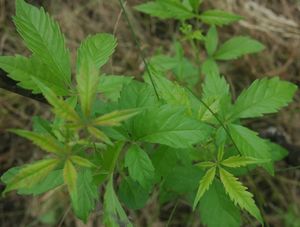Note: This is a project under development. The articles on this wiki are just being initiated and broadly incomplete. You can Help creating new pages.
Difference between revisions of "Vitex agnus-castus - Chastetree"
(→Uses) |
(→Common names) |
||
| Line 15: | Line 15: | ||
==Common names== | ==Common names== | ||
| − | {{Common names|kn=|ml=|sa=|ta=|te=|hi=|en= | + | {{Common names|kn=|ml=|sa=|ta=|te=|hi=|en=:Chaste Berry}} |
==Habit== | ==Habit== | ||
Revision as of 10:36, 18 April 2018
Chasteberry(Nirgundi) or Vitex negundo, commonly known as the Chinese chastetree,five-leaved chaste tree, or horseshoe vitex, is a large aromatic shrub with quadrangular, densely whitish, tomentose branchlets. It is widely used in folk medicine /Traditional medicine , particularly in South and Southeast Asia.
Contents
Uses
Breast tenderness, PMS, Menstruval cramps, Menopause, Prostate cancer
Parts Used
Chemical Composition
Cineole,C10H17O. Iridoid glycosides, agnoside, aucubin, eurostoside, Flavonoids[1]
Common names
| Language | Common name |
|---|---|
| Kannada | |
| Hindi | |
| Malayalam | |
| Tamil | |
| Telugu | |
| Marathi | NA |
| Gujarathi | NA |
| Punjabi | NA |
| Kashmiri | NA |
| Sanskrit | |
| English | :Chaste Berry |
Habit
Identification
Leaf
| Kind | Shape | Feature |
|---|---|---|
| Simple | reminiscent | The leaves are very reminiscent of the marijuana plant (Cannabis sativa) and feature five leaflets in a palmately compound arrangement. They have a fragrance like that of the herb sage |
Flower
| Type | Size | Color and composition | Stamen | More information |
|---|---|---|---|---|
| Unisexual | purple, white | 5 | The purple flower clusters (called panicles) look like those of the butterfly bush (Buddleja spp.) Varieties with white flowers are also available |
Fruit
| Type | Size | Mass | Appearance | Seeds | More information |
|---|---|---|---|---|---|
| oblong | They look like peppercorns and are sometimes used to flavor food | four seeds | {{{6}}} |
Other features
List of Ayurvedic medicine in which the herb is used
- Vishatinduka Taila as root juice extract
Where to get the saplings
Mode of Propagation
How to plant/cultivate
Chaste trees need full sun and very well-drained soil. It’s best not to plant them in soil that is rich in organic matter because organically rich soils hold too much moisture close to the roots[3]
Commonly seen growing in areas
Near bodies of water, recently disturbed land, Grasslands, Mixed open forests
Photo Gallery
References
External Links
- Pages that are stubs
- Ayurvedic Herbs known to be helpful to treat Breast tenderness
- Ayurvedic Herbs known to be helpful to treat PMS
- Ayurvedic Herbs known to be helpful to treat Menstruval cramps
- Ayurvedic Herbs known to be helpful to treat Menopause
- Ayurvedic Herbs known to be helpful to treat Prostate cancer
- Herbs with fruit used in medicine
- Herbs with berries used in medicine
- Herbs with leaves used in medicine
- Herbs with stem used in medicine
- Herbs with common name in English
- Habit - Tree
- Index of Plants which can be propagated by Seeds
- Index of Plants which can be propagated by Cuttings
- Herbs that are commonly seen in the region of Near bodies of water
- Herbs that are commonly seen in the region of recently disturbed land
- Herbs that are commonly seen in the region of Grasslands
- Herbs that are commonly seen in the region of Mixed open forests
- Herbs



